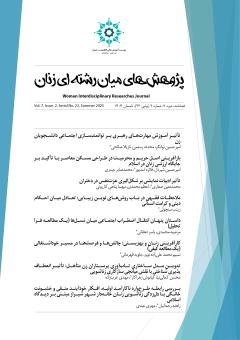ملاحظات فقهی در باب روش¬های نوین زیبایی: تعادل میان احکام دینی و کرامت انسانی
محورهای موضوعی :
1 - استادیار گروه فقه و مبانی حقوق اسلامی، واحد زاهدان، دانشگاه آزاد اسلامی، زاهدان، ایران.
کلید واژه: ملاحظات فقهی, زن, روشهای نوین زیبایی, احکام دینی و کرامت انسانی.,
چکیده مقاله :
یکی از مهمترین ساحتهای وجودی انسان، کرامت و ارزشمندی اوست؛ انسان دارای دو نوع کرامت ذاتی و اکتسابی است؛ آنچه میتواند زمینه سعادت و رستگاری او را فراهم کند، کرامت اکتسابی و ارزشی است که در پرتو ایمان و اعمال صالح به دست میآید. بیگمان برخورداری زنان از کرامت انسانی، بر مبانی و پایههای مهمی ازجمله بُعد معنوی شخصیت زنان و نقش آنان در انسانسازی، ظرفیت تحصیل علم و دستیابی به کمالات انسانی، برخورداری از نیروی تعقّل و اندیشه و هدف غایی در خلقت آنان استوار است. در این پژوهش که به روش توصیفی تحلیلی انجام شده، این نتایج حاصل شده است که: اگرچه میل به زیبایی و تنوّع طلبی، از جمله امیان فطری در وجود انسان است که در زنان بهعنوان یکی از مظاهر زیبایی و جمال به هنگام خلقت قرار داده شده است؛ لیکن چنانچه از این میل در راه صحیح استفاده نشود و موجب توجّه افراطی زنان به مصادیق آرایشهای نوپدید و در نهایت تبرّج و خودنمایی شود؛ ازآنجاییکه نتیجهای جز ابتذال شخصیت زن، غفلت از فلسفه آفرینش و بازماندن از سیر تکامل اخلاقی و معنوی به دنبال ندارد، در منافات با کرامت و منزلت جایگاه زن قرار میگیرد که به حکم قاعده عقلی «دفع ضرر احتمالی واجب است»، باید ترک شود.
One of the most significant dimensions of human existence is dignity and intrinsic worth. Human beings possess two types of dignity: inherent and acquired. The latter, acquired dignity, which is attained through faith and righteous deeds, serves as the foundation for achieving happiness and salvation. Undoubtedly, women’s enjoyment of human dignity is rooted in fundamental principles, including the spiritual dimension of their personality, their role in shaping humanity, their capacity to pursue knowledge and achieve human virtues, their faculty of reason and intellect, and the ultimate purpose of their creation. This study, conducted using a descriptive-analytical method, has yielded the following findings: Although the desire for beauty and variety is an innate inclination in human nature—manifested in women as an embodiment of beauty and grace bestowed upon them at creation—if this inclination is not channeled appropriately and leads to an excessive focus on emerging beauty practices, ultimately resulting in ostentation and self-display, it produces nothing but the degradation of a woman’s character, neglect of the purpose of creation, and hindrance of moral and spiritual growth. Such outcomes stand in contradiction to the dignity and status of women. Based on the rational principle that "preventing potential harm is obligatory," these practices must be avoided.
